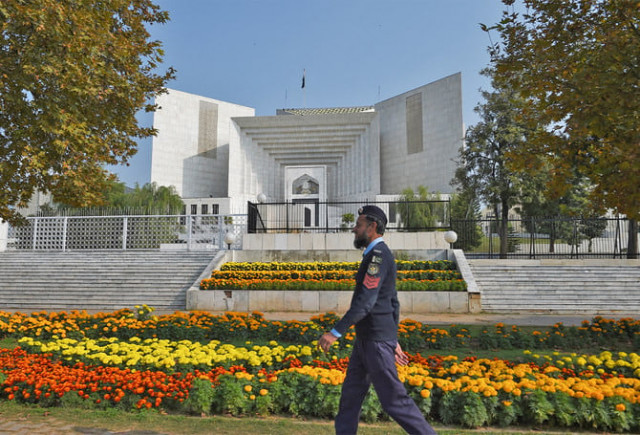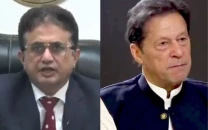SC finds it hard to take suo motu notices to logical ends
Govt body submits interim report to top court’s HR cell on murder of journalist Arshad Sharif

As Chief Justice of Pakistan Umar Ata Bandial has invoked the suo motu jurisdiction in journalist Arshad Sharif's murder case, these proceedings have always remained challenging for the apex court to make them reach their logical conclusions.
This is the third suo motu notice taken by CJP Bandial during his 10-month tenure.
It is the SC's extraordinary jurisdiction, which can only be triggered by the chief justice himself.
CJP Bandial had invoked suo motu jurisdiction over the alleged interference of the executive in the affairs of prosecution and investigating agencies in high-profile cases.
The suo motu notice was taken on the recommendation of one SC Judge Justice Sayyed Mazahar Ali Akbar Naqvi.
The purpose of the suo motu was to end the executive interference in the criminal justice system.
However, the major opposition party PTI was complaining about the executive institutions’ interference in criminal matters related to its leaders.
The second suo motu was initiated when the SC had set aside then National Assembly deputy speaker Qasim Suri’s ruling on the no-confidence motion against then prime minister Imran Khan in April this year.
Later, the CJP had revealed that that suo motu notice was taken after consulting with 12 SC judges.
The third suo motu is being initiated on the recommendation of two SC judges -- Justice Ijazul Ahsan and Justice Muhammad Ali Mazhar.
Instead of issuing an order, the SC issued a news statement on Monday evening wherein it is was stated that the killing of journalist Arshad had "not only shocked the whole nation but also caused unrest amongst the journalist community”.
“The killing [of Arshad] was publicly decried, and an overwhelming number of requests were sent to the apex court to intervene in the matter and ensure dispensation of justice inaccordance with the Constitution and law,” it read.
"The prevailing public sentiments were observed by the Hon'ble Chief Justice of Pakistan and accordingly he tasked the Human Rights Cell of the Supreme Court to conduct the necessary inquiry. The report filed by the DG, Human Rights Cell was sent by the Hon'ble Chief Justice to Hon'ble Justice Ijaz Ul Ahsan and Hon'ble Justice Muhammad Ali Mazhar for their opinion[s]. Both the learned Judges recommended the invocation of the original jurisdiction under Article 184(3) of the Constitution in the matter,” it added.
It is not clear as to whether the CJP had consulted other judges on the matter or not.
Earlier, when Prime Minister Shehbaz Sharif had written letter to the CJP requesting for the constitution of a full court commission to probe the murder of the journalist along with the assassination attack on Imran in Wazirabad, the majority judges were not in favour of the SC's intervention.
PTI supporters are claiming that the CJP was compelled to take suo motu notice of this matter after receiving of thousands of letters in the last couple of days.
However, during the hearing, the chief justice noted that the SC HR cell was looking into the matter.
Even an interim report was submitted by a government-formed fact-finding committee to the cell.
Now, the SC is waiting for the final report of the committee.
During the hearing, the CJP expressed his anger at the federal government for not sharing the final report of the committee.
It is being witnessed that since March 2009, the apex court has taken several suo motu notices in sensitive matters but the outcome of these proceedings could not be concluded at their logical ends because of several reasons.
Even a large number of people have expressed their greviences against these suo motu proceedings, as they were not beneficiaries, but victims.
First, the SC has limitations to look into the matters and it is dependent upon the executive agencies.
There is also a lack of ownership of the institution.
No parameters are being determined by the SC to initiate suo motu jurisdiction.
Several judges in their judicial orders have also urged for determining the scope of suo motu jurisdiction, but in vain.
The new CJP does not own the suo motu cases initiated by his predecessor.
CJP Bandial invokes this extra jurisdiction under Article 184 (3) differently on matters which he believes that are more of public importance.
Since February, Senior Puisne Judge Justice Qazi Faez Isa, who is scheduled to be the next CJP, is not being included in any special or larger bench hearing important high-profile cases.
Senior lawyers say that the exclusion of the senior judge from special benches will raise serious questions on the credibility of the judicial proceedings.
Even the SC’s moral authority will be eroded due to exclusion of the senior-most judge to hear important cases.
To ensure transparency, the CJP must form larger benches comprising senior-most judges in the footsteps of ex-chief justice Asif Saeed Khosa.
If the present practice continues, the lawyers say doubts will raise on the intentions behind the invoking of the suo motu jurisdiction.
If the suo motu jurisdiction is being endorsed by only one section of the SC judges, then it is impossible to hold the 'powerful circles' accountable.
Only a united court can make them accountable.
In the present case, the greviences of the slain journalist’s family are also against the ‘powerful circles’.
A debate is under way as whether or not the present SC will hold them accountable.



















COMMENTS
Comments are moderated and generally will be posted if they are on-topic and not abusive.
For more information, please see our Comments FAQ